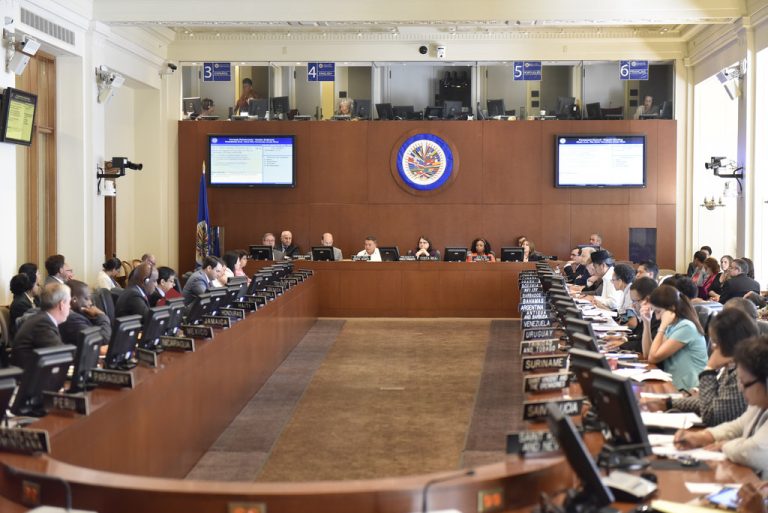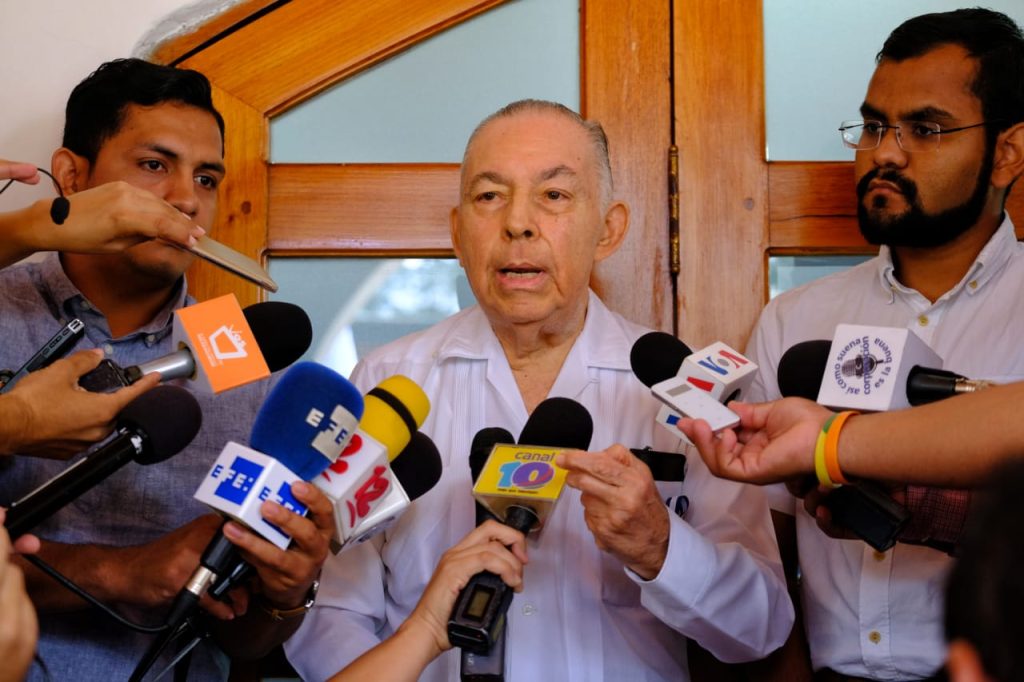25 de agosto 2019

Children of Exile: The Births “Sowing Hope” in the Camp of Nicaraguan Farmers

PUBLICIDAD 1M
PUBLICIDAD 4D
PUBLICIDAD 5D
Carlos Tunnermann, coordinator of the Civic Alliance: Receiving the Commission “is of inevitable compliance”.

The group is made up by Argentina
The Organization of American States (OAS) has taken almost two months to move towards the formation of a high-level diplomatic commission to address the crisis of Nicaragua. Once formed “It would be a serious mistake,” of the Ortega government not to receive this delegation, warns the former diplomat and Coordinator of the Civic Alliance, Carlos Tünnermann Bernheim.
The creation of this commission was a mandate of the OAS General Assembly—the highest instance of the regional organization–, which took place at the end of last June in Medellin, Colombia. But it was until last Friday that it became known that the delegation will possibly be composed of a representative from the United States, Canada, Argentina, Jamaica and Paraguay.
The approval of this group will be discussed on Wednesday of this week, when the OAS Permanent Council meets, which will once again have the Nicaraguan crisis on its agenda. The high-level commission will be required to submit a report on the situation in Nicaragua, within a maximum period of 75 days, as approved by the foreign ministers in Medellin.
“The most erroneous decision that Ortega could make would be to reject (the commission); if he rejects it, the application of article 21 of the Democratic Charter would come,” Tünnermann said, during an interview on the program “Esta Semana” (This Week). This article establishes the suspension of a member state of the regional body.
The Ortega government has not allowed the entry into the country of an OAS Working Group, which is made up of 12 countries and was approved by the Permanent Council in August of 2018. However, Tunnermann notes that not accepting the high-level commission “would show contempt for the entire Organization of American States, including the Caribbean countries that have mostly abstained,” from voting against Nicaragua.
Next Wednesday the OAS Permanent Council will meet to confirm the high-level diplomatic commission. What does the Alliance expect from that commission and the efforts of the OAS?
According to what was approved in Medellin, with 22 votes in favor, this commission has the purpose of urging the Government and the Civic Alliance to resume the negotiating table. For our part, we are willing to do so. We did not cancel the negotiating table, we suspended our assistance, in circumstances that warranted our withdrawal in protest, for the murder of Eddy Montes in prison; and because there was a preliminary commitment that the political prisoners on the reconciled list would leave in May.
We were there up to May 20 and at that time not a single prisoner was out, consequently we said that we suspended our assistance, but we did not withdraw from the negotiating table for those reasons.

Carlos Tunnermann, member of the Civic Alliance negotiating team. Photo: Carlos Herrera / Confidencial
What does the Alliance expect from the dialogue between the commission (of the OAS) and Ortega? You say that the Alliance is ready to negotiate, but Ortega closed the negotiation.
One of the things that the commission will bring is to tell Ortega that there is an agreement of the OAS General Assembly, organization to which the State of Nicaragua is a party, which urges both parties to resume the dialogue at the negotiating table, but it also calls for the return of the Inter-American Commission on Human Rights, the MESENI [monitoring mechanism] and a representation of the United Nations High Commissioner for Human Rights.
It is also said that some of the efforts that they come to make are at a high level, which means they come to talk with the presidential couple about these issues. Furthermore, there is talk of electoral reforms to guarantee the people of Nicaragua their right to freely choose their authorities.
What happens if Ortega does not accept this commission, before he expelled the IACHR, the UN, the GIEI?
If Ortega does not accept this commission, he would make a very serious mistake because it will be a contempt for the entire Organization of American States including the Caribbean countries that have mostly abstained. It will be a rebuff to not receive this commission, which is an agreement of the highest body of the organization, which is its ordinary General Assembly.
It seems to me that the most erroneous decision that Ortega could make is to reject it. If he rejects it, the application of article 21 of the Democratic Charter would come. Because they (the commission) come in compliance with article 20, and in compliance with that article the high-level diplomatic efforts are made, but if they fail because they cannot come or because upon the commission’s arriving Ortega closes down and does not give in to anything, then, the commission will have to inform the Permanent Council, which by absolute majority can call an extraordinary General Assembly. In that Assembly the report will be received and with 24 votes in favor, Nicaragua could be suspended from the Organization of American States, which would definitely close the doors of credits from the Inter-American Development Bank (IDB).
How do you interpret the statement of the OAS General Secretary, Luis Almagro, in which he excluded Ortega from the list of dictatorships in America?
It has seemed a surprising and unfortunate statement, and we also believe it contradicts what Mr. Almagro himself has said before. He was the first that suggested to the Permanent Council that conditions were given in Nicaragua to begin the process of applying the Inter-American Democratic Charter.
It means that in Nicaragua there is a regime that does not meet the essential requirements of a democracy; consequently, it seems completely out of place for Mr. Almagro to say that there are only two dictatorships on the continent: Cuba and Venezuela, when he has previously requested that the procedure corresponding to the Inter-American Democratic Charter be followed.
We are surprised because the delegations of the Alliance that have visited him have always stated that he agrees with the negotiating table; believes that free and transparent elections would be necessary for the change that the country needs.
*The full interview with Carlos Tunnermann will be broadcast on Sunday, August 26, at 8:00pm in “Esta Semana” on the Confidencial Nica channel of YouTube.
Archivado como:
PUBLICIDAD 3M
Confidencial es un diario digital nicaragüense, de formato multimedia, fundado por Carlos F. Chamorro en junio de 1996.
PUBLICIDAD 3D